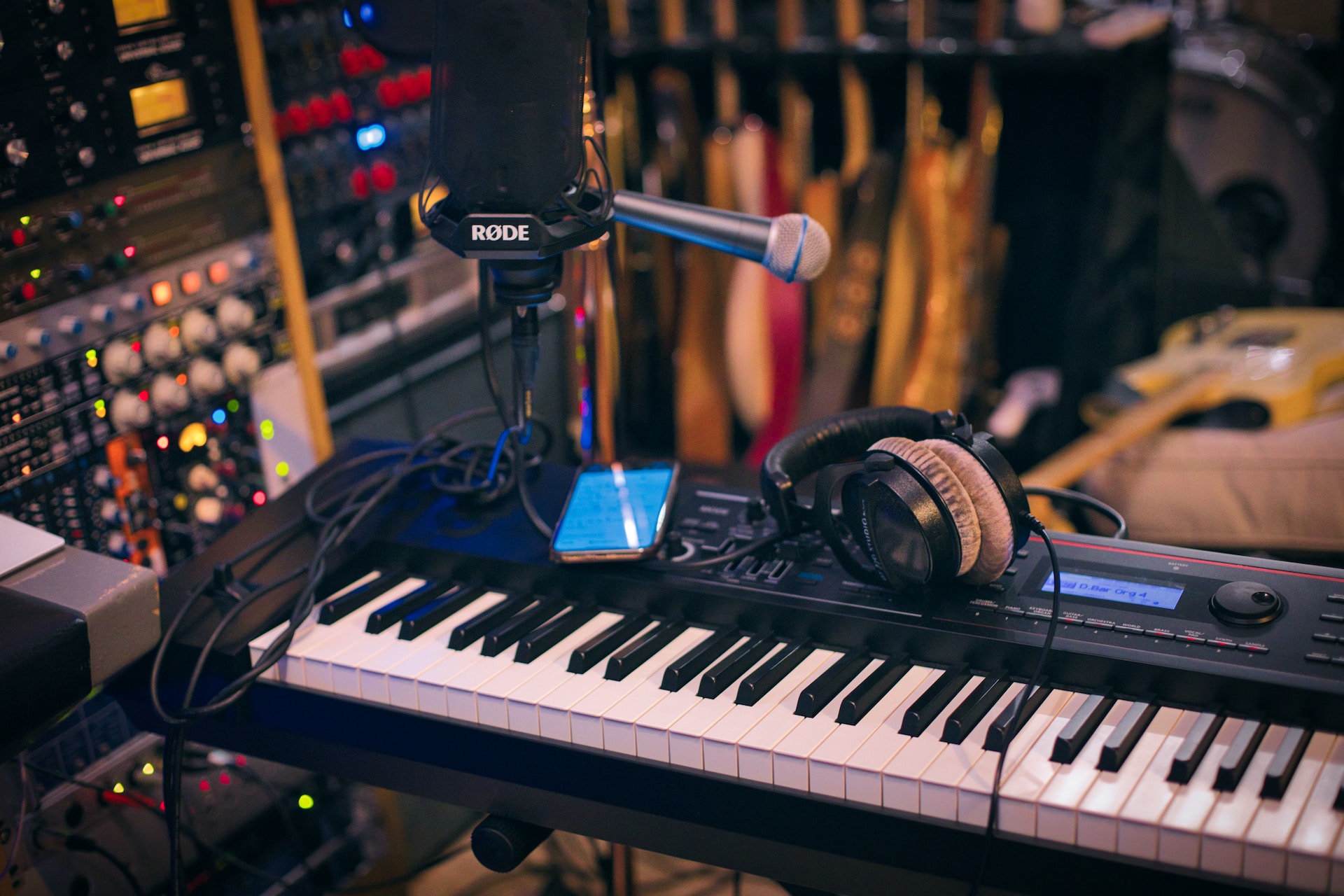B.M. Music Composition Program Map

Keyboard & Guitar Concentrations
This program is designed for those students who wish to become composers or who wish to pursue graduate study and seek teaching positions in higher education. In addition to the specific degree programs, students find enrichment through concerts, recitals, workshops, and master classes by visiting performers and scholars.
Accounting Stats
60
Core Credit Hours
48
Major Credit Hours
12
Elective Credit Hours
- Plan Your Degree
- Crush Your Course
- Find Your Place
- Broaden Your Perspectives
- Connect Off-Campus
- Take Care of Yourself
- Pave Your Path
Plan Your Degree
Disclaimer: This program map is intended ONLY as a guide for students to plan their course of study. It does NOT replace any information in the Undergraduate Catalog, which is the official guide for completing degree requirements.
| Course Name | Credit Hours |
|---|---|
|
C1: ENGL 1101
English Composition I |
3 |
|
M: MATH 1001, 1111, OR 1113
Quantitative Skills & Reasoning, College Algebra, or Precalculus |
3 |
|
I2: XIDS 2002
(Recommended) What do you know about the Worlds of Music |
2 |
|
MUSC 1000
Comprehensive Music Laboratory |
0 |
|
F: MUSC 1301
Music Theory I |
3 |
|
F: MUSC 1401
Aural Skills I |
1 |
|
F: MUSC 1501
Keyboard Skills I |
1 |
|
F: MUSC 2600
Principal Applied |
1 |
|
F: MUSC 27X0
Marching Band or Concert Choir |
1 |
Milestones:
- Complete ENGL 1101 with a grade of C or better.
- Complete Core IMPACTS Math.
- Complete MUSC 1301, 1401, and 1501.
- Satisfactory attendance in MUSC 1000.
- Satisfactory performance in MUSC 2600.
| Course Name | Credit Hours |
|---|---|
|
C2: ENGL 1102
English Composition II |
3 |
|
F: MUSC 1302
Music Theory II |
3 |
|
MUSC 1000
Comprehensive Music Laboratory |
0 |
|
F: MUSC 1402
Aural Skills II |
1 |
|
F: MUSC 1502
Keyboard Skills II |
1 |
|
F: MUSC 2600
Principal Applied |
1 |
|
F: MUSC 27X0
Concert Choir or a concert band |
1 |
| I1: Written and Oral Communication | 3 |
| T1: Non-lab Science | 3 |
Milestones:
- Complete ENGL 1102 with a grade of C or better.
- Complete MUSC 1302, 1402, and 1502.
- Satisfactory attendance in MUSC 1000.
- Satisfactory performance in MUSC 2600.
15 Fall Credit Hours + 16 Spring Credit Hours = 31 Credit Hours
Additional Information:
- Music courses must be taken as scheduled. Failure to pass a sequential Music course will result in a delay of progression of one year. Having to repeat a course does not affect progression in other courses, except where the unsuccessful course is a prerequisite.
- ENGL 1101, ENGL 1102, XIDS 2002, and MATH 1001, 1111, or 1113 must be taken in the first year of study. Otherwise, Core IMPACTS curriculum courses may be taken in any order.
| Course Name | Credit Hours |
|---|---|
|
MUSC 1000
Comprehensive Music Laboratory |
0 |
|
MUSC 2301
Music Theory III |
3 |
|
MUSC 2401
Aural Skills III |
1 |
|
MUSC 2501
Keyboard Skills III |
1 |
|
MUSC 3603
Percussion Techniques and Materials |
1 |
|
MUSC 3605
Voice Techniques and Materials |
1 |
|
F: MUSC 2600
Principal Applied |
2 |
|
F: MUSC 27X0
Marching Band, Wind Ensemble, or Concert Choir |
1 |
|
S1: HIST 1111 OR 1112
World History |
3 |
| A: Humanities | 3 |
Milestones:
- Complete MUSC 2301, 2401, and 2501.
- Satisfactory attendance in MUSC 1000.
- Satisfactory performance in MUSC 2600.
| Course Name | Credit Hours |
|---|---|
|
MUSC 1000
Comprehensive Music Laboratory |
0 |
|
MUSC 2302
Music Theory IV |
3 |
|
MUSC 2402
Aural Skills IV |
1 |
|
MUSC 2502
Keyboard Skills IV |
1 |
|
MUSC 2600
Principal Applied |
2 |
|
MUSC 27X0
Concert Choir and or concert band |
1 |
|
MUSC 3601
Woodwind Techniques and Materials |
1 |
| T2: Science + Lab | 4 |
| A: Humanities | 3 |
Milestones:
- Complete MUSC 2302, 2402, and 2502.
- Satisfactory attendance in MUSC 1000.
- Satisfactory performance in MUSC 2600 & level change exam.
16 Fall Credit Hours + 16 Spring Credit Hours = 32 Credit Hours
| Course Name | Credit Hours |
|---|---|
|
MUSC 1000
Comprehensive Music Laboratory |
0 |
|
MUSC 3604
String Techniques and Materials |
1 |
|
MUSC 3701
Western Music before 1800 |
3 |
|
MUSC 3850
Conducting |
3 |
|
MUSC 4400
Counterpoint |
2 |
|
MUSC 4410
Applied Composition |
2 |
|
MUSC 4600
Principal Applied |
2 |
|
MUSC 47X0
Marching Band, Wind Ensemble, or Concert Choir |
1 |
|
MUSC XXXX
Upper-division elective |
1 |
Milestones:
- Complete MUSC 3701 DSW requirement.
- Satisfactory attendance in MUSC 1000.
- Satisfactory performance in MUSC 4600.
| Course Name | Credit Hours |
|---|---|
|
MUSC 1000
Comprehensive Music Laboratory |
0 |
|
MUSC 3230
Technology in Composition & Improvisation |
2 |
|
MUSC 3602
Brass Techniques and Materials |
1 |
|
MUSC 3702
Western Music After 1825 and World Music |
3 |
|
MUSC 4600
Principal Applied |
2 |
|
MUSC 47X0
Concert Choir or a concert band |
1 |
|
MUSC 4944
Half Composition Recital |
2 |
|
MUSC XXXX
Upper-division elective |
2 |
Milestones:
- Complete MUSC 3702 DSW requirement.
- Satisfactory attendance in MUSC 1000.
- Satisfactory performance in MUSC 4600.
- Satisfactory completion of MUSC 4944 Half Composition Recital.
15 Fall Credit Hours + 13 Spring Credit Hours = 28 Credit Hours
| Course Name | Credit Hours |
|---|---|
|
MUSC 4200
Orchestration and Arranging |
2 |
|
MUSC 4410
Applied Composition |
2 |
|
MUSC 4240
Form and Analysis |
2 |
|
MUSC 4610 OR 4850
Secondary Applied or Applied Conducting |
2 |
|
MUSC 47X0
Marching Band, Wind Ensemble, or Concert Choir |
1 |
|
MUSC XXXX
Upper-division elective |
2 |
| S2: Social Science | 3 |
Milestone:
- Apply for Graduation.
| Course Name | Credit Hours |
|---|---|
|
MUSC 4610
Secondary Applied |
1 |
|
MUSC 4945
Full Composition Recital |
3 |
|
MUSC XXXX
Upper-division elective |
2 |
|
P2: POLS 1101
American Government |
3 |
|
P1: HIST 2111 OR 2112
US History |
3 |
| T3: STEM Course | 3 |
Milestone:
- Satisfactory completion of MUSC 4945 Full Composition Recital.
14 Fall Credit Hours + 15 Spring Credit Hours = 29 Credit Hours
Crush Your Course
First Year:
- Develop an accountability group with your music core classmates.
- Create a personal Google calendar with classes, rehearsals, and practice time.
Middle Years:
- Meet regularly with your faculty mentor.
- Attend office hours with your professors.
- Prepare and perform your half recital.
Last Year:
- Check on your upper level music electives.
- Prepare and perform your senior recital.
Find Your Place
First Year:
- Consider joining a student organization like cNAfME, ACDA, or Phi Delta.
- Attend as many student recitals and ensemble concerts as you can.
Middle Years:
- Get your chamber ensemble credits - perform in multiple ensembles.
- Settle in to a daily practice routine that you develop with your applied teacher.
Last Year:
- Write a piece of music for a UWG ensemble to perform.
- Develop a personal website to showcase your music.
Broaden Your Perspectives
First Year:
- Attend multiple concerts outside of your area.
Middle Years:
- Attend an Atlanta Symphony Orchestra and Chorus concert at the Woodruff Center.
- Explore summer workshop/seminar possibilities in your area.
Last Year:
- Audition for a summer festival in your area.
- Consider a study abroad program.
Connect Off-Campus
First Year:
- Consider volunteering for a community organization or local music event.
- Attend a musical event at the Carrollton Center for the Arts.
Middle Years:
- Find opportunities to gig in the area with ensembles, churches, etc.
- Consider a summer employment opportunity in music.
Last Year:
- Explore summer internship opportunities in music.
- Connect with UWG comp alumni.
Take Care of Yourself
First Year:
- Visit Health Services and UREC to explore all your options on campus.
- Balance your coursework, personal practice, and concert attendance.
Middle Years:
- Take a fitness class, climb the rock wall, or join an intramural team.
- Visit counseling services and consider taking a mental health screening.
Last Year:
- Develop a post-graduation exercise and wellness plan.
- Explore loan repayment options and complete your exit counseling.
Pave Your Path
First Year:
- Visit Career Services.
- Consider applying for on-campus employment.
Middle Year:
- Develop your CV and learn about networking on social media.
- Attend GMEA conference in Athens in January.
Last Year:
- Request references from your professors/supervisors.
- Attend interview workshops.
- Apply to graduate programs.
Careers

Career Opportunities
This degree may help you get work as the following:
- Arranger
- Concert/Event Producer
- Concert Hall Marketing Director
- Copyist
- Creative Entrepreneur
- Freelance Composer
- Music Composer
- Music Director
- Orchestrator
- Pit Orchestra Musician
HeadingSub-Heading
Have any questions about your major?
Don't forget to check out Wolf Watch to explore degree requirements!
